CCELL Thanks You!
Each year in November, we will spotlight members of our S-L family to recognize their wholehearted commitment to the Baton Rouge community through service. This page will be updated to feature our Q&A interviews with faculty/staff, students, and community partners.
2023
What are you most thankful for this academic year?
I am thankful for the wonderful students I have worked with. I started this academic year with good news from my former students who shared updates on their new jobs and academic pursuits. Teaching and mentoring students is rewarding in itself, but when they stay in touch with me and share their updates and achievements, that makes me feel grateful for what I do.
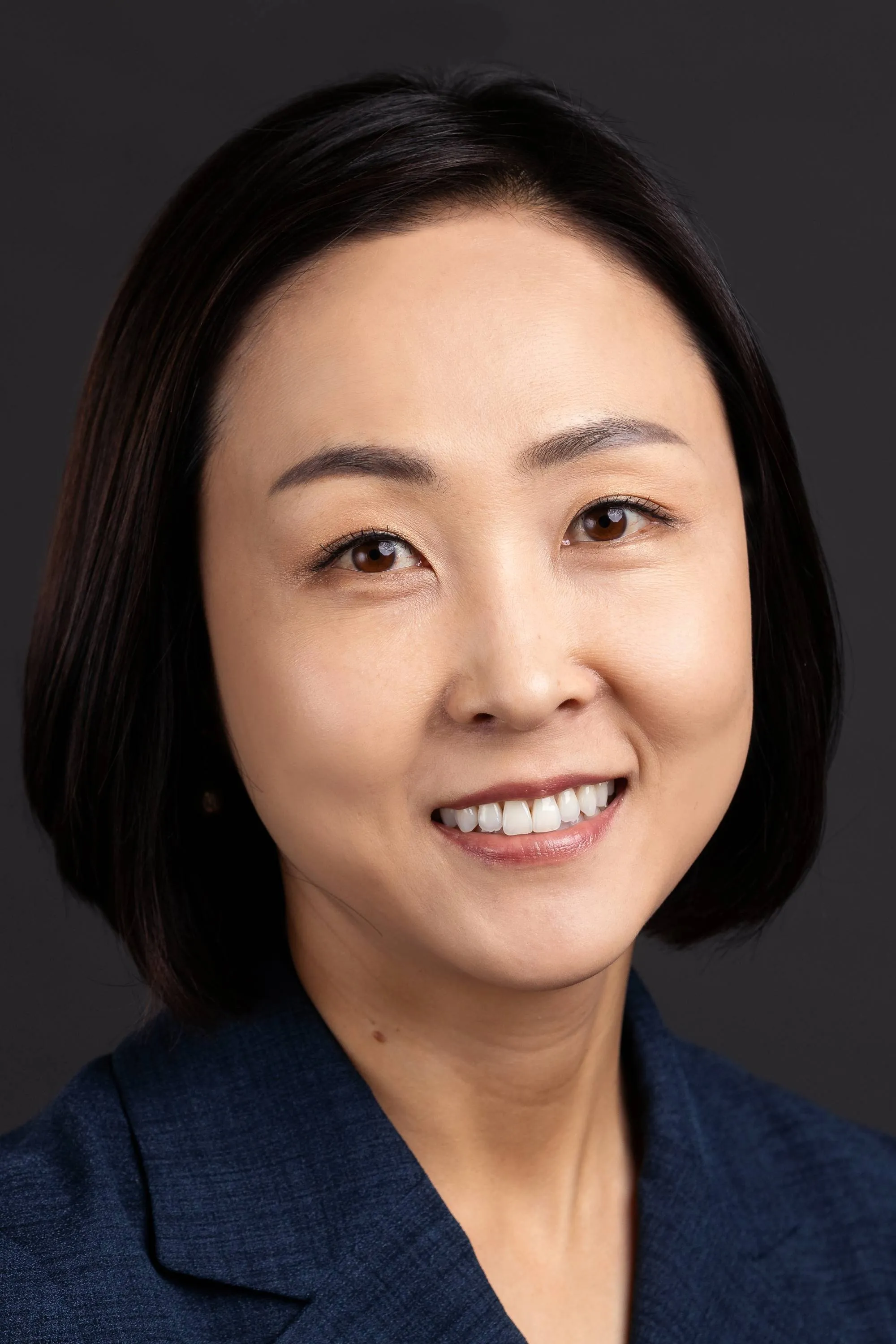
Dr. Hyojung Park is an associate professor and the Blue Cross Blue Shield Louisiana Professor of Health Communication in the Manship School of Mass Communication. Photo Credit: LSU
What motivated you to offer MC 4005: PR Campaigns as service-learning required?
I can’t take full credit for the decision to offer PR Campaigns as a service-learning course. This was one of the courses I taught in my first semester at LSU, and it had been offered as service-learning required. However, even if it hadn’t been offered that way, I would have included a service-learning component in the course.
PR Campaigns is the capstone for public relations majors, and they take it in the final semester of their senior year. This means that students in the class have acquired all the foundational knowledge and skills that they would need to join the workforce. What they need most at that point is a hands-on opportunity to apply their knowledge and hone their communication skills and techniques. Service-learning is a perfect match for the course for this reason. It also can benefit both students and community partners, who are mostly nonprofit organizations. I often see that nonprofit organizations have ideas for promoting their cause but lack adequate manpower to put them into action. Through this course, students bring those ideas to life by finding and implementing approaches that will address their community partners’ needs and help them achieve their organizational goals.
Also, I have witnessed many times that students become actively engaged in their learning and motivated to brainstorm ideas and find effective ways for their community partners to better communicate their messages to the audience. Service-learning in this course allows students to see the value of their work and gain experience in the profession that they are about to enter.
How has your partnership with Special Olympics of Louisiana—Baton Rouge enhanced your teaching experience? Describe how your students address the learning objectives through service.
How the PR Campaigns class works is that students work in groups of five or six with nonprofit organizations as if they were working in a real public relations agency. Each student assumes a specific role on their agency team, such as account executive, creative director, or research director. They take on a campaign project from the first week and create a comprehensive public relations campaign for their nonprofit client, which includes traditional media and social media promotions, and event planning and implementation.
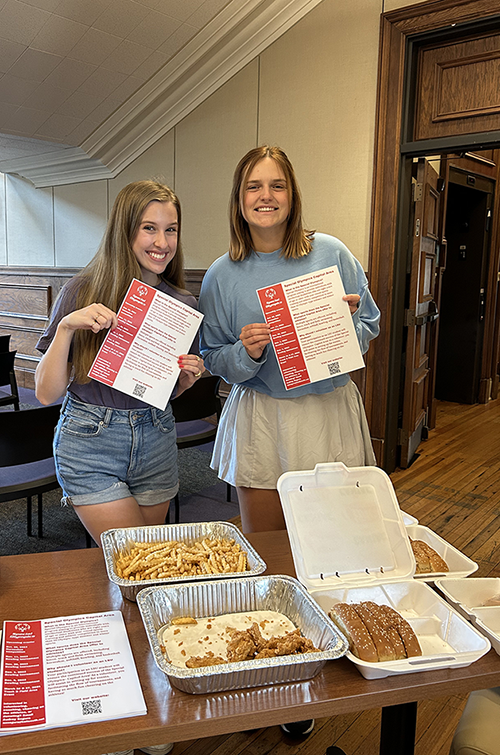
LSU Mass Communication seniors Juliette LeRay and Vivian Robinson promote the Special Olympics Louisiana Capital Area and its volunteer opportunities at the tabling event with free Cane’s Chicken in the Journalism Building. Photo Submitted by: Dr. Hyojung Park
This semester, students continue working to increase awareness and recruit volunteers, with a specific focus on the LSU community, particularly undergraduate students. They conducted a survey of LSU students earlier in the semester to find out what would make students interested in volunteer opportunities with Special Olympics and to identify any barriers that might hinder their engagement with those opportunities. There was a lack of awareness among LSU students about Special Olympics and the volunteer opportunities available to them. So, the student agency team for Special Olympics had a table sit on campus, reached out to student organizations, and gave out free Cane’s, along with flyers about Special Olympics. They are also coordinating a giveback night with a local Baton Rouge business to benefit the organization.
Over the course of the semester, students gain many hands-on opportunities through conducting research and creating deliverables, such as feature stories, press releases, flyers, and social media posts. The research and planning process also helps them improve their critical thinking skills as they are trying to develop informed communication strategies based on their research findings.
Students learn best by doing. As great lessons in life often come from our mistakes and failures, students can learn in the most productive way through making mistakes and addressing problems. For this reason, I use a “drafting-feedback-revising” approach when grading service-learning assignments in this class. I give students multiple opportunities to submit their project drafts to me for review and to make revisions based on my feedback before turning the final project in for a grade. This effort has helped students learn from their mistakes and to improve the quality of their final product. It also has been helpful to me in understanding students’ weaknesses and areas that they can improve on.
Have you noticed any tangible results or changes in your students' attitudes, skills, or behavior from participating in your service-learning course?
Watching students grow professionally and academically over the course of a semester is a privilege of this service-learning course. Campaign planning and implementation reinforce what they have learned and help them practice their skills. Students also become more professional in communicating with their client, addressing teamwork issues amongst themselves, and providing counsel to the client. In addition to academic and professional growths, students come to recognize the importance of civic engagement and the key role that public relations can play in advocating for a cause. A student from this past spring said that this service-learning class had taught her much more about public relations than any other classes because she and her team were able to put their knowledge to use. The service-learning component of this class appears to spark student interest and bring joy in their efforts to help nonprofits.
Would you recommend other faculty members to offer service-learning courses? If so, how would you describe the benefits of providing service-learning courses to them?
I would definitely recommend that other faculty consider turning their courses into service-learning experiences for their students. By participating in service-learning, students are able to connect what they’ve learned to their professional lives and careers. They can also see the real-world impact of their work, which I think makes them more motivated and enthusiastic about what they are learning. Service-learning provides an opportunity for students to think about what they can contribute to the community and the roles they can fulfill in society through their profession.
What are you most thankful for this academic year?
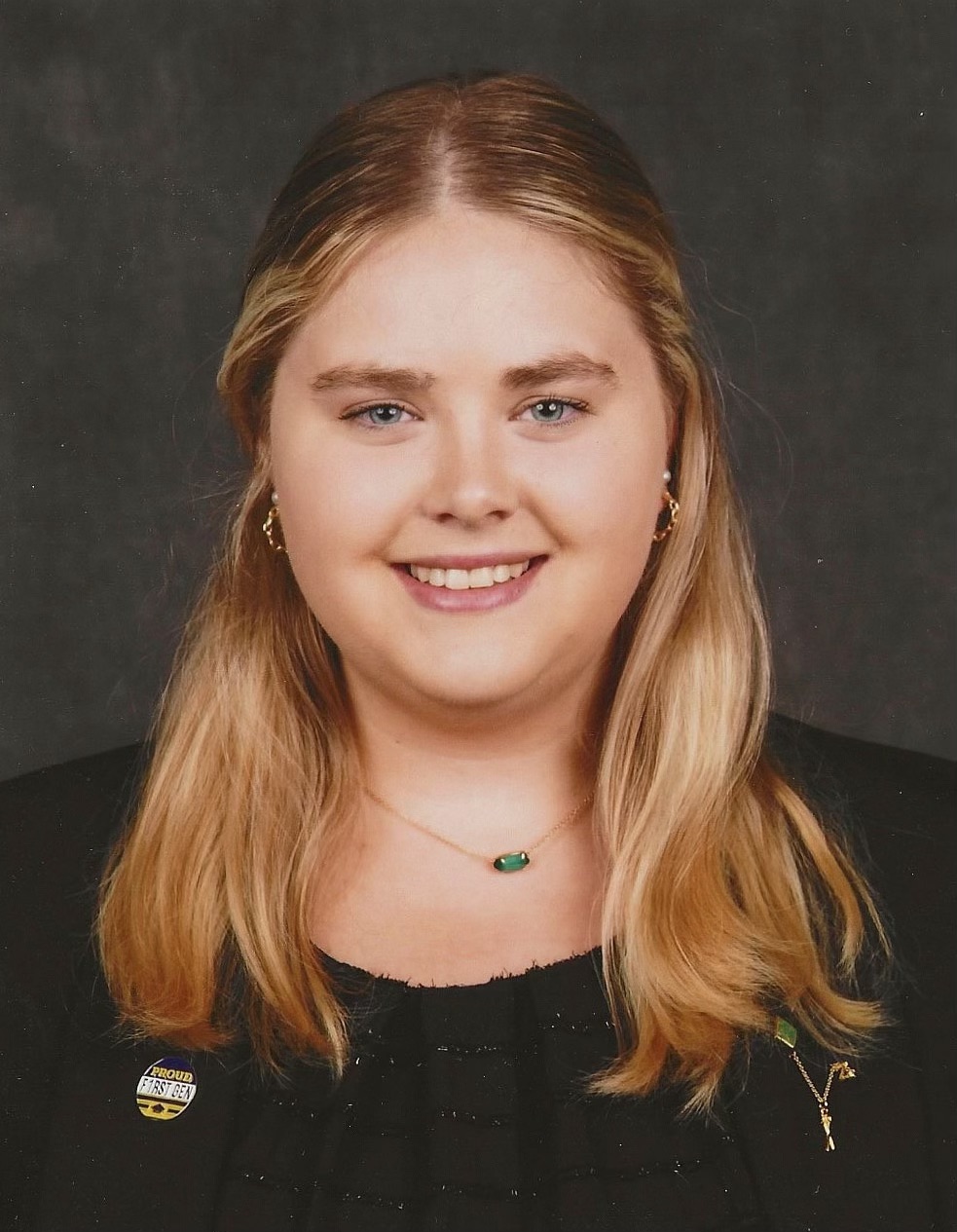
As a Spring 2024 Engaged Citizen Program candidate, Saylor has completed 13 service-learning credits and more than 200 hours of service. Her service opportunities include: The Corn Maze at Burden Museum and Gardens and Parkview Baptist School. Photo Submitted by: Saylor Higgins
I'm thankful for my recruitment director position and my sorority. I am thankful to be able to recruit for us and get more people interested in agriculture and animals, especially when raising money for local animal shelters. It has also been great to get more similar-minded girls to join our group and be more cohesive in what we do.
Through your Environmental Management Sciences (EMS) minor, you’ve taken three service-learning required courses. If you can recall, what was the first S-L course that you took, and how would you describe your learning experience?
The first one I took was EMS 1011 (Environment and Technology: Perspective on Environmental Problems). In my first semester, I added the minor and went to a lake cleanup. We took out invasive species from the lake. The following week, I went to Baton Rouge Magnet High School and was educated on coastal erosion by middle schoolers. It was hands-on, and I really liked it. I've always enjoyed helping the environment. Being able to physically go out and do something to help during my first semester did more than [just] learning about the issues [in class] for me.
Have you noticed any changes in your attitudes, perspectives, or skills due to your involvement in service-learning courses?
I’ve definitely grown in my communication skills. In high school, I hated speaking in front of people. However, through the different service opportunities I've done, I had to learn to communicate with different types of people from different backgrounds, and now I am more confident.
My community engagement skills have also grown, and my perspectives have changed. I feel like whenever I was growing up, whatever my parents thought, I thought too. But now, I see things in my own way and have a broader perspective and appreciation for things.
As an Engaged Citizen, you’ve also completed over 200 hours volunteering in the community, which is well over the required minimum. How do you balance serving the community with your other responsibilities?
My classes are mainly in the morning, and I try to work only a little during the semester to focus on my grades. But I know with my minor classes, there's always service-learning involved. So, I branch out on weekends when I can volunteer or during the holidays. So, many of my hours were gained over Christmas or Thanksgiving break, working with kids or at the farm with my boss. I’ve worked with the corn maze mainly, AGMagic, and then with the children at my old school.
What advice would you give to students interested in taking service-learning courses in the future?
Try at least one class. And it helps you give back to the community that provides everyone else so much. It also helps build character. I like that you get to go out and experience different things and meet other people in the community with varying backgrounds. So, give it a shot one semester and take one class! See what opportunities are presented to you. Your teachers will even help you find opportunities at times. I think going with a group would also help with someone’s first time. Even just doing a few hours is great!
What is your organization most thankful for this year?
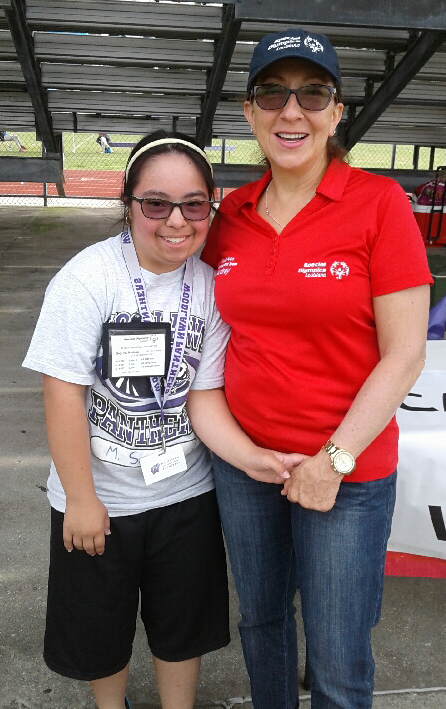
Special Olympics Louisiana Capital Area has worked with Dr. Hyojung for a few years. Pictured with her daughter Marissa (left), Audrey Segura works with LSU mass communication seniors to increase their understanding of the marketing and public relations needs of a non-profit organization. Photo Submitted by: Audrey Segura
Special Olympics Louisiana Capital Area is most thankful for the return of athletic events. The COVID-19 pandemic had the negative effect of not allowing any athletic competitions or interactions between our athletes. For some of our athletes, Special Olympics is the only source of community interaction and physical exertion. We are so grateful to have finally experienced a "normal year."
What motivated your organization to partner with Dr. Hyojung Park and her PR Campaign (MC 4005) service-learning course? Describe how the partnership has helped address a critical need for your organization.
Special Olympics Louisiana Capital Area has had very positive experiences dealing with the marketing class pre-COVID. We were so happy to hear that Dr. Hyojung Park was looking for non-profits to once again partner with her class and we were thrilled when we were approached as a potential participant. We are an organization that depends heavily on volunteer involvement. After COVID, we lost contact with a lot of our supporters. Dr Park's class has helped spread the word about the need for support from our community. Those needs include donations, coaching, and volunteering at local events. We are a 10-person volunteer management team responsible for staging all sporting events and fundraising for the eight parishes we represent. We could not do all that we do without a support system.
Have you enjoyed your partnership with Dr. Park and her students, and if so, what aspects of this collaboration do you find most rewarding?
Special Olympics Capital Area Louisiana has had a great experience this semester. Our PR team of students is very enthusiastic and has eagerly taken on the task of finding volunteers for several of our events and seeking financial donors to help us continue to provide our athletes the opportunity to experience the thrill of competition.
From your perspective, how has your organization contributed to the learning experience for LSU students? And what benefits has your organization gained from being an LSU community partner?
We have provided them with the opportunity to gain a first-hand understanding of the workings of a non-profit entity (e.g. marketing, solicitation, organization, execution, etc.) for a fundraising event. Beyond this, they potentially experienced a moment of epiphany when they realized that providing for those in our community who require our additional assistance yields a new perspective and even a re-prioritization of personal values. We have benefited by having some fantastic LSU students come out and volunteer at several of our events and hearing from them how much they enjoyed being with the athletes and how they intend to continue participating in Special Olympics.
Does your organization have any additional volunteer needs this academic year (November 2023-May 2024) that you would like us to share?
YES! Special Olympics Louisiana Capital Area is always in need of volunteers. There are several sports that we are not able to offer because we do not have coaching volunteers. It takes hundreds of volunteers to help run and stage all of our athletic events. The need for volunteers never goes away and partnering with Dr. Park's class allows us to reach a younger demographic.
Contact Audrey Segura at aasegura@bellsouth.net for more information about volunteer opportunities with Special Olympics Louisiana Capital Area.
2022
What does service-learning mean to you?
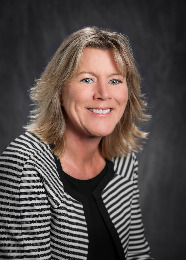
Dr. Kim Skinner is one of only a few faculty members who offers a service-learning course each semester.Photo Submitted by Dr. Skinner
Service-learning is an opportunity to give back; [it is] an opportunity to make a lasting impact on the lives of others. Through the integration of community service and course content, my students deepen their understandings of concepts by applying what they learn. For example, in my summer service-learning course, my grad students read about and discuss literacy theories and literacy pedagogy each morning, then they evaluate and apply that knowledge each afternoon by running a free summer reading camp for elementary-age children in the Carver Library [located in the] neighborhood [of] Old South Baton Rouge. Everyone involved in this partnership of the EBR Parish Library system, the university, and the families of Old South Baton Rouge contribute to a common purpose, a shared goal. Service-learning reinforces student learning through thoughtful action while also addressing needs in the community; it’s a win/win.
When did you begin offering your course as service-learning? And how long have you
offered them?
After attending a CCELL Faculty Scholars workshop in Summer 2019, I converted the two graduate reading courses I taught at Carver Library to service-learning EDCI 7105: Literacy for Elementary Grades and EDCI 7131: Disciplinary Literacy. Adding the service-learning component to my syllabi broadened the course focus beyond the acquisition and application of theoretical and content knowledge to include students’ abilities to collaborate with others, apply empathy, and critically reflect.
Due to the positive impact of the service-learning component in my graduate reading classes, I began offering an undergraduate reading course EDCI 3137: Assessing & Guiding Classroom Reading Instruction as service-learning in Spring 2021; and in Fall 2021, I added EDCI 3200: Reading, Writing & Oral Communication in the Elementary School as service-learning. In both of these courses, the students provided service to EBR public school teachers, parents, and children. All four of these courses are now continually taught as service-learning.
Why did you choose to implement S-L practices in your class?
Service-learning practices add value by providing students with opportunities to take action, collaborate with others, and understand their own and others’ talents and strengths. Through service-learning pedagogy, students learn to listen, communicate, reflect, and develop productive relationships. I added S-L practices because I wanted my university students to act on the problems that young people in under-resourced communities have and to empathize with those who have them.
What do you think you, your students and community partner(s) have gained by participating
in your service-learning course?
Well, one way I benefitted is through a more nuanced understanding of some of the day-to-day difficulties experienced by people in under-resourced schools and communities. What I personally observed or read in my service-learning students’ critical reflections persuaded me to address these challenges in my own teaching. I also teach my students to see beyond the traditional roles so everyone is involved, so everyone feels powerful.
My students examine their experiences with service-learning through reflection throughout each course. Several students expressed how, over time, they became sensitive to the feelings and experiences of others, and they realized how much they never knew. A few described what they learned as transformational to their future teaching careers.
Our library community partner expressed an increase in their daily count of patrons and checked out materials when we run the summer reading camp, and the bump in attendance and resources lasts to some degree for the rest of each summer. Many of the neighborhood children return year after year, and a few have asked to continue even after they “age out.” Particularly valued by me, at the end of each reading camp, the children’s self-reported motivation to read is positively impacted every single summer.
What would you like service learning on LSU’s campus to look like in 10 years?
Wouldn’t it be wonderful if all LSU students could experience at least one service-learning course each year they were on campus? Just imagine…the LSU campus would be a place where every young person had the chance to further practice community engagement, innovation, perseverance, and empathy.
Why is it important to engage in community service while in college?
In our current world where the rate of change continues to accelerate, awareness of the shifting needs of members of our communities is critical. While course-related service learning projects necessarily have start and end dates, the change within individuals as a result of providing community service continues long after the service has ended. Community service positively affects how one thinks about the world and interacts with members of the community.
What has been your favorite service memory so far?
My favorite service-learning memories stem from watching my former students return to our community partners as volunteers long after their course has ended. For example, two of my grad students came back weekly as after-school homework mentors at Carver Library the following school year. Another graduate student became a volunteer at Front Yard Bikes, a community bike shop across the street from Carver Library (many of our summer reading camp children also frequent Front Yard Bikes). One former Carver Library partnership student curated additional social justice readings and returned to the reading camp courses the following summer to collect data for her dissertation. Four of my undergraduate reading students volunteered on their days off at La Belle Aire Elementary School (our partnership site for EDCI 3200) to assist with the Halloween carnival, deliver coats, read with small groups of children, and tutor English Language Learners (children who have a home language other than English). These are just a few examples of how former service-learning students continue to make a positive difference in schools and communities.
What advice would you give to faculty and students on campus who are looking to become
more involved with their community?
For faculty, I recommend attending the CCELL Service-Learning Faculty Scholars workshop. This five-week seminar walks you through topics such as finding community partners, funding sources, sample syllabi, and sample reflection assignments. I highly recommend it!
For students, I recommend exploring the criteria for the Engaged Citizen distinction. The primary criteria for distinction are taking 7 credit hours of service-learning designated courses, 100 hours of community service beyond course requirements, and the completion of a reflective paper. Several of my undergraduate students are currently working on this distinction, which is added to your transcript and acknowledged at graduation. I highly recommend it!
What does service-learning mean to you?
Service learning to me is beyond what you would learn in a classroom at your desk. [With service-learning,] you actually get to apply what it is that you learn in the classroom in a public setting, and the things that you can do to help your community.
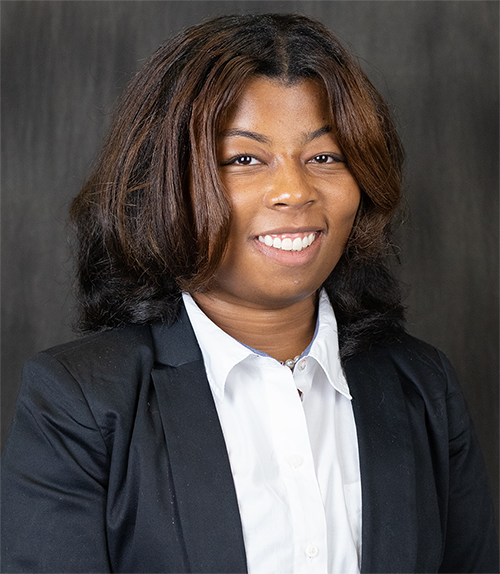
LSU biological sciences senior Courtney Hall will graduate with the Engaged Citizen distinction this December. Photo Submitted by Courtney Hall
What was the first service-learning class that you took, and what was the experience like?
I would have to say it was Introduction to African American Studies [AAAS 2000], and
it was an eye-opening experience because the assignment was to look up an unsung hero
in the Civil Rights Movement. I did my project on Dr. Dorothy Boulding Ferebee, and there's so many things that she did in regard to public health for minorities
and things like that. She just didn't get the recognition that she should have for
all the work that she did do. So, being able to learn about her, and then to share
all of her accomplishments with the class and with my professor, was an amazing experience.
Why did you choose to take service-learning classes?
The first time I took the service-learning class it kind of happened by chance, but
I had such a positive experience with it, and I wanted to be able to apply to do more
service learning courses. I felt like, if you could expand knowledge on to people
within the community, or to just share what you do know in the community to improve
the conditions, then do it.
What have you gained by participating in your service-learning courses?
Honestly, I feel like I've been able to connect more with the Baton Rouge community
as well as the LSU community because there's so many different disparities and needs
[such as food insecurity] and among college students. Being able to address those
issues and helping out [gives me] a good feeling.
Have you become more civically engaged as a result of participating in service-learning?
I feel like I take issues more seriously within the community, and I want to make more of an effort to improve the conditions. Service-learning has made me more aware of issues. I'm now in a human sexuality course [KIN 2600] and I'm doing an assignment regarding victim blaming in sexual violence. And you know [this topic is one] that I would normally, I'm not going to say overlook, but things that I normally wouldn't have an opinion about before. I realized that you can't just let certain things fall by the wayside. If you want change, you do have to speak up, and you do have to take action.
What would you like service-learning on LSU’s campus to look like in 10 years?
I hope to see more courses actually involved with service-learning. I feel like this is program is almost a hidden gem, and not that many people know about it. When you do find out about it, you almost become engulfed in it like, "how could I not help the community and really better myself?" Also, this program actually equips you for the real world because the issue that you're tackling in the program like sexual assault, food disparities, racial discrepancies and others are what you're going to see in the real world. So, being able to address it now as an undergrad is excellent practice as you transition into graduate school or go into the workforce.
How did you start doing community service?
I started high school. Service was required for certain organizations that I had, but as I transitioned into college, and I started to volunteer at the LSU Food Pantry to boost my resume, I started to see that there was even more community service out there. So, I got involved in more activities [around campus and the community]. I’m in this organization called Minority Science Pre-Professional Society (MSPPS), and we had a chance to volunteer at a race as medical volunteers. [It was interesting because] we had a hands-on experience as to what first aid professionals do in times like that.
Why is it important to engage in community service while in college?
I feel like it goes hand in hand with your education. Being in college is way more than just filling out assignments or meeting deadlines; it's about really being a part of your community, understanding what it is, and knowing what people around you go through each and every day. Your [future] job in your career is to understand how the people around you cope and work with certain things and what certain issues are surrounding you. [Community service] is becoming more aware of all of these issues. [Service] equips you to be a better college student and more involved in the community.
Tell me about your organization. What critical need does it address in the Baton Rouge community?
VIPS is an independent local nonprofit that strives to foster student success by enlisting volunteers and establishing school/community partnerships within East Baton Rouge Parish school district. Following the pandemic, students need dedicated volunteers more than ever, who can improve students’ reading and math skills. It is our goal to pair every underperforming student recommended to our Everybody Reads and Everyone Counts programs with a VIPS Reading or Math Friend.
What LSU courses and professors has your organization partnered with?
VIPS has a long history of partnering with LSU. These opportunities allow LSU students to give back to their communities as well as to improve the academic journeys of underserved public-school students. Following is a list of our LSU partners: Engineering professor Nicholas Totaro, LSU School of Social Work, [LSU Mathematics Instructor] Mr. Michael Muffuletto, Dr. Sassy Wheeler, Dr. Eugene Geist, and Dr. Elecia Lathon in the School of Education.
Each spring semester, the LSU LSAL Honors College and Dr. Marybeth Lima’s classes serve as Reading and Math Friends. Reading and Math Friends individually
tutor pre-k – 2nd grade students throughout the semester to strengthen reading or
math skills. The professors may add their own requirements such as the number of tutoring
sessions they must complete, creating games or activities, or writing weekly reflections
describing their visits.
Why is being a community partner important for your organization and the population that you serve?
Being a community partner is important for VIPS because it gives our organization
the opportunity to serve as change agents for underperforming students. VIPS believes
that the entire community is responsible for providing a quality education for all
students. When our students succeed, our communities can thrive. Data indicates that
VIPS programs positively impact participating students.
What are some projects or tasks that students have worked on for your organization?
Students have served as Reading and Math Friend volunteers, where they tutor their assigned student on a weekly basis throughout the semester. They meet with their students consistently, working on key reading and math skills. Some have also helped to develop tutoring resources or create activities for our volunteers to utilize during their Reading or Math Friend sessions. Several of our partners prefer mentoring students such as our program, “Lunch with a Tiger” in which students visit students during their lunch period to discuss listed topics on achieving academic success and managing life in college. This allows many of our students to begin to think about their futures and to consider college as an option.
What has been the most memorable thing you have seen a student do while serving at your organization?
The most memorable things we have witnessed are the friendships created through the Reading and Math Friend pairings. Our students love it when their LSU Reading or Math Friend comes to visit them at school. It makes them feel special and important. Many view their Reading or Math Friend as a best friend or big brother or sister. Volunteers help their students gain confidence and thoroughly enjoy witnessing those light bulb moments!
Emily Demps [ECP Spring 2025 candidate] is in her second year as a Reading Friend. Over those two years, she has helped students feel special. Her current student is learning to love to read through their time spent reading fun books together. He also loves showing off that he can run fast like Sonic the Hedgehog!
Sanaa Alam was a dedicated Reading Friend for years before she graduated! In addition, she helped develop a program at Park Medical Academy that provided a free copy of Highlights Magazine subscription for every student in the school!
One of our Reading Friends began participating as an Education major as part of the late [LSU School of Education professor & service-learning faculty member] Dr. Sassy Wheeler’s class. Throughout the semester she spent individually tutoring her student, she learned that she loved helping students in that type of environment and she was inspired to change her major to social work so she could make an impact in a different way!
One of our Reading Friends discovered that her student didn’t have many books at home, so she gifted him books during some of their visits together. Once when she came to visit her Reading Friend, he was excited to share that his dad, a carpenter, had built him a bookshelf to store all his new books from his Reading Friend!
Our Reading Friends help their students feel special, develop confidence and develop a lifelong love of learning!
What would you want the future of service work at your organization to look like in
10 years?
In 10 years, we envision the future of service work for our organization to include the entire community coming together to ensure that every student who is struggling receives the assistance to excel in school. We envision collaborative efforts coming from our two major universities in Baton Rouge to create volunteer opportunities to encourage every college student into engaging in community service. One community working together for one common cause: the wellbeing of our students.
Why should more students participate in service-learning?
More students should participate in service-learning because students gain a sense of purpose and progress. It gives them an opportunity to work hands-on in the community to be a changemaker. It also is an amazing networking opportunity. College students can meet many like-minded individuals who they can possibly work to connect with in the future.
What are some future events or programs that volunteers can look forward to in your organization?
VIPS always has opportunities to serve our community. Students could simply reach out to me at shendon@ebrschools.org to inquire about opportunities in the area or visit our website at www.vipsbr.org. One major event we have on the horizon is Dr. Seuss Day on March 2, 2023.
The state of Louisiana is in a literacy crisis. Last year, only 40% of kindergarten students were identified as reading at or above grade level. Literacy can help change a student’s life! Our students need your help. The time commitment of being a Reading or Math Friend is just 30 minutes a week. We have over 400 recommended students on our waiting list who need a Reading or Math Friend. Join us this Spring! You can get started after Winter Break in January.
To become a Reading Friend or Math Friend, you must:
- Be at least 18 years old
- Complete a 1 and a half hour volunteer training session
- Be able to commit to 10 visits with your student in the spring semester
- Have transportation
- Pass a background check and complete a volunteer application
- Volunteer hours vary but our programming is during regular school hours (8:30 am to 2:30 pm)
- Spring programming will run January to April
We host weekly volunteer training sessions and offer virtual options. We can schedule a time to meet if you don’t see a time that works for your trainings. You can view our upcoming training sessions here: vipsbr.org/vips-trainings or contact Tara Schoonover at EveryBodyReads@ebrschools.org with any questions.
2020
What does service learning mean to you?
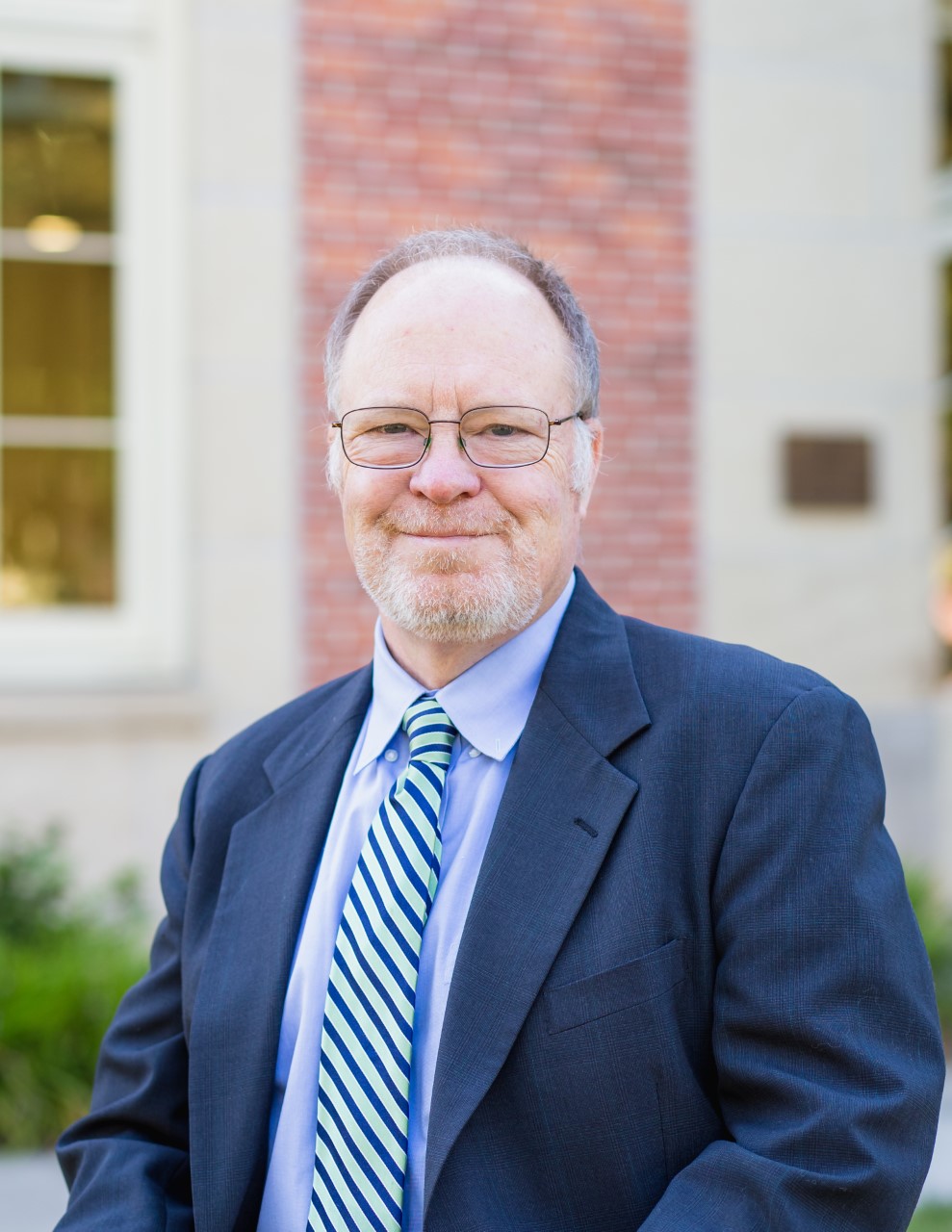
Dr. Granger Babcock has taught HNRS 2013: The Strate of Louisiana as service-learning for thirteen years.
To me, it means giving my students an opportunity to apply the things they learned in the classroom in the community. But I think more importantly, at least from my perspective, it gives them the opportunity to work with vulnerable populations in the community so that they can begin to understand their problems and what is actually taking place on the ground. Most of the times, the students I teach are not in the same spaces as really, really vulnerable members of our community. I think it is important for the students to hear and listen to people who are vulnerable, what they go through, and what their daily struggles are.
When did you begin offering your course as service-learning? And how long have you
offered?
The course (HNRS 2013: The State of Louisiana) that I use service-learning with is a cohort in the Honors College called the LASAL scholars. That stands for Louisiana Service and Leadership, and it is a group of students who are sort of laser-focused on what we consider to be the two largest problems in Louisiana, which are coastal wetland loss and poverty and everything where those two things intersect. We started this program 12 or 13 years ago, and from the very inception, we had our students working with Volunteers in Public Schools (VIPS) because we thought it was important for our students to learn about the struggles that poor children have with their education and in their lives as well.
Why did you choose to implement S-L practices in your class?
There are certain things that you cannot learn in a classroom. For example, you can’t learn about a poor child when you are studying poverty in a classroom. You can learn statistics and things like that, but you can’t learn about the daily struggles that a child growing up in poverty has with their health care, their education, their housing, their access to food, and stable relationships. You can’t learn about these things in a book, and I think proximity is really important and it is one thing that we really stress.
How has the Coronavirus pandemic changed your approach to incorporating service-learning
into your course?
It really hasn’t changed my intent to do it; it just changed the way that we have to do it. We work with Volunteers in Public Schools, and we have to do this via Zoom at this point. So in some ways it changes the experience, but that doesn’t make it any less important.
What struggles did you encounter when attempting to incorporate service during this semester?
[One struggle was] the logistics of last spring. We went from basically having school in-person to basically everything hopping on Zoom and I think the logistics of moving from in-person to online were a struggle for us at first. We had to find ways to circumvent that, and I don’t think we were really effective at it. I think we will be much more effective at it this spring because we have a protocol in place now to deal with it, but last spring it was like building the plane as it was taking off protocol.
How did you consider the safety of your students and the need for service to build
an opportunity for your course? What was difficult about this? What was surprisingly
easy?
Our paramount concern is the safety of our students, and then just as important of a concern, is the safety of the students we serve. So in order to build an opportunity during the pandemic, those are the two things that we absolutely took into consideration. I think building the opportunity was difficult, but what was really interesting was how quickly our [community] partner was able to work with us. We’ve been working with the same partner, Volunteers in Public Schools, for twelve years. We love that organization, and because we have a long history, it was easy to work with them and get something established.
What do you think you, your students, and community partner(s) have gained by participating
in your service-learning course?
I have just gained local lived experience knowledge, and that’s really important. Sometimes you really don’t understand what is going on in a community until you listen to people in the community talk, and then all of these issues kind of open up. My hope is that this doesn’t just happen for me but also happens for our students. I think they gain a lot of practical real-world knowledge by participating in a program like this. And they begin to understand the constraints of their own agency in some way, and also begin to understand structural barriers to other people, basically having full participation in this democratic experience that we call the United States.
What would you like service-learning on LSU’s campus to look like in 10 years?
It would be nice if everyone was required to do service-learning because I think it is that important. It would also be nice to establish settling LSU offices in some of the communities around the campus, specifically in Old South Baton Rouge, so we can sort of leverage our labor to help that community in a more direct way.
Why is it important to engage in community service while in college?
There are a number of different ways to learn things, and to me, one of the most important things is to learn about other people and other people’s experiences in a culture or in a location where you live. We are often separated by barriers of race, barriers of social class, and a number of other barriers, but I think it is important to tear these barriers down and gain insight into how somebody else lives.
My father used to tell me when I was a child that you never really understand someone until you walk in their shoes, and I think that kind of understanding is really, really rare right now. I think that because our culture is so hierarchical and there are so many barriers to people interacting, I think this interaction is very important. And the other really important thing is the students will find that the older they get—unless they seek out these opportunities (and we hope this [course] lays the groundwork for that)—they are going to become more and more isolated in their families and in their communities. At the age of 40, no one is going to ask you to do service-learning; you’re going to have to do it on your own. I think it is really important that people while they’re young and eager for experiences like this that we ask them to do it.
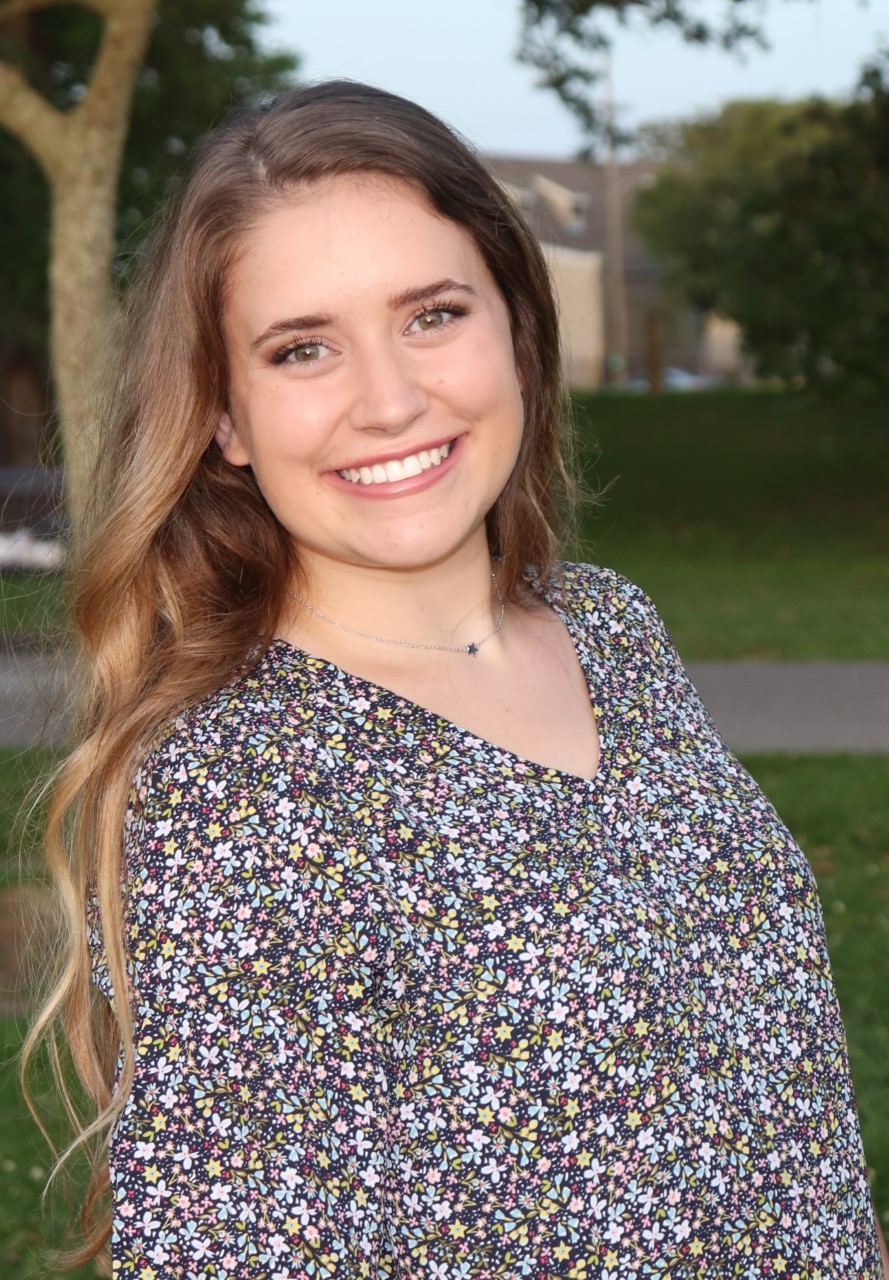
LSU elementary education senior Naomi Westbrook will graduate with the Engaged Citizen distinction Fall 2020.
What does service learning mean to you?
To me, service-learning means taking your learning beyond the classroom and making it an active experience by putting it into practice with the needs of the community. Service-learning allows for an opportunity to learn more and learn deeper about the world around us and the topic at hand. There’s a common phrase that says people learn best by doing and service-learning gets us to participate in that “doing” while helping people and communities that are struggling to provide for themselves because of whatever circumstance. Not only do we get the enriched learning experience to enhance our educational atmosphere, but we get to also contribute to the betterment of another, which is the only way to find the fulfillment we are all seeking as social beings.
What was the first service-learning class that you took, and what was the experience
like?
The first service-learning class that I took was an English Composition class (ENGL 2000) that focused on multicultural perspectives and gaining cultural awareness. For that course, we were paired with an international student in order to help them learn and practice their English and for us to be able to learn more about their culture, background, and gain valuable experience with cross-language communication. This was a very insightful and educational experience for me because it made me think deeper about empathy and the importance of diversity in our world. I was able to understand what it truly meant to develop cultural understanding and emotional intelligence. Because of this experience, I have become more aware of the social issues existing in the world and have started to learn how to appropriately advocate for the issues that affect others even if it does not affect me.
What was the service-learning experience like during the COVID crisis? How was it
similar or different to prior experiences?
I was not able to participate in service-learning during the COVID crisis.
If you participated in e-service, how did you take extra steps to make it meaningful?
If you were able to participate in in-person service, how did you address the differences
in COVID protocol for organizations?
I was not able to participate in service during the COVID crisis.
Why did you choose to take service-learning classes?
I chose to take S-L classes because I wanted to add more enrichment to my learning experience at LSU. By participating in service-learning courses I gave myself the opportunity to take the things I was learning in the classroom and bring it out in the real world. I feel as though I was able to make a bigger difference for the community around me than I would have been able to by just sitting in my classrooms discussing what could be done. My S-L classes helped me to put those discussions into action and hold me accountable for the things I told myself I wanted to do to make my community stronger.
What have you gained by participating in your service-learning courses?
By participating in service-learning courses, I gained a lot of appreciation for those who do service and put their words into actions. I also feel as though participating in service-learning courses helped me to integrate service into my daily life. By participating in my service-learning courses, I definitely gained a better understanding for the community around me and the strengths and challenges that the community is facing. Without having had the opportunity to go into the community and offer my service, my understanding of the issues facing the community would have remained shallow. My participation helped me deepen my understanding by seeing some of the issues first-hand, which in turn has allowed me to become a better advocate for those issues.
Have you become more civically engaged as a result of participating in service-learning?
I definitely have become more civically engaged as a result of participating in service-learning. The volunteering I did with service-learning courses helped me to find a better appreciation for service and held me accountable for my desire to provide service to my community. Because I was being exposed to and participating in service consistently through my S-L courses, service naturally found itself added to my routines and habits. I found myself more drawn to participating in volunteer work even when there was no “benefit” (a class grade for example) in it for me. The connection and appreciation I gained for volunteering and service became a big part of the way I developed while in college.
What would you like service-learning on LSU’s campus to look like in 10 years?
I hope that service-learning takes on a larger role on campus over time. I would like to see LSU’s campus and courses so engaged with service that it became a natural expectation and addition to more coursework for students. Service truly helps develop people into more well-rounded and culturally aware individuals, so I’d love for LSU to encourage more service so that when students come to LSU, they see that as a strength and plus of choosing to become a Tiger!
How did you start doing community service?
I started doing community service in high school as part of being a member in various different organizations, but it wasn’t until I came to college that I started to connect with and fall in love with giving to my community. I started at LSU when Baton Rouge experienced the terrible flood in 2016. Before I even started classes, I participated in service work to help local schools and neighborhoods affected by the flood simply because I was anxious to see the new city that I called home. However, at the time I was unaware of the impact those days of service would have on me. From then, I started to see service and volunteer work become ingrained in all that I aimed to do. After seeing the ways that I could help another only because of a simple difference in life circumstances, I began to experience a calling and heavy heart to give to others. Since then, I’ve taken every attempt to make sure I find ways to serve others in all that I do, both by large-scale volunteering and simple, small acts of willing good.
Why is it important to engage in community service while in college?
In my opinion, college is a time to learn about yourself, others around you, and the greater world to develop as respectful and engaged members of society in order to contribute positively to the world around you. When we participate in community service with pure intentions and out of genuine desire to give to another, we begin to create deeper connections to a part of the world we probably would have never experienced before. These connections allow us to become more selfless and empathetic. Those are traits very necessary in order to contribute to society with the goal of a greater and equitable growth for all in mind. It is important to participate in community service while in college because this is the time where we are learning the how’s and the what’s of giving to the world around us (by exploring our chosen career paths) so for us to learn better and understand deeper, we must also add the do’s and why’s to our schema, which community service allows us to do!
Tell me about your organization. What critical need does it address in the Baton Rouge community?
Our organization, [Beyond Gymnastics], provides gymnastics classes to children with and without special needs in our community. There is a need for activities in our area that are inclusive of children with various abilities and disabilities. We strive to provide a program where children with differences are not only accepted, but have their individual needs addressed and praised in our community.
What LSU courses and professors has your organization partnered with?
We have been in contact with Kourtney Baker, Sarah Becker, and Megan Rodgers through our partnership with CCELL. (Beyond Gymnastics has partnered with Engaged Citizen students since Spring 2020 through CCELL’s service-learning contract option experience.)
Why is being a community partner important for your organization and the population that you serve?
We love having volunteers that enjoy learning about and working with the children in our program. We have small group classes for children with special needs, and the extra eyes can always improve our students’ learning. We have gotten to know the students who have volunteered with us so far, and they have each brought great value to our organization. Some have connected with the families of students within our program. There is a huge need among the parents in our program for reliable and experienced babysitters and help with their children, and often these volunteers have helped these families make important connections.
What are some projects or tasks that students have worked on for your organization?
Students have helped manage and teach our special needs classes. This sometimes meant helping students wait their turns, entertaining them and keeping them sitting safely with the group until their name is called, etc. Other times, the students were asked to help actually direct the children through their simple gymnastics circuit including running, jumping, climbing, etc.
How did the COVID crisis change the way community engagement looked like for your organization?
Prior to COVID, volunteers from CCELL were often holding student’s hands, sitting them in their laps, and assisting with physically spotting skills. The job was a lot more hands-on. Coming back after COVID, fortunately, we have still been able to engage with the community and partner with CCELL. This has been great for our program as we have needed extra help with cleaning/sanitizing, washing kids’ hands, etc. The volunteers’ jobs have been less hands-on, more verbal and modeling.
What was it like learning how to involve community members in service through this pandemic?
At first, we were hesitant to add any extra people in our gym because of the risk of spreading germs. We soon learned that we needed all hands on deck to allow sufficient cleaning and social distancing. So we were able to use community members to help with cleaning mats, keeping children separated, etc. while our main coaches could stay focused on leading the class.
What has been the most memorable thing you have seen a student do while serving at
your organization?
We’ve been surprised by how much initiative the students have taken. They have often anticipated the needs of our staff without us asking. For example, as I was talking with Alyssa (Winkler, Kinesiology senior) on a short break between classes, I was also trying to rush and get some class rosters finalized and printed. I printed a document and before I knew it, the paper was magically in my hands. Alyssa handed me what I needed before I even had a chance to think about standing up to go get it out the printer. This might seem like a meaningless task, but I was so surprised that someone was paying attention to what I needed at that exact moment and found a way to help me. She now positions herself between my desk and the printer anytime I’m using my computer, and I constantly remind her how much I appreciate that one random time she grabbed that paper for me.
What would you want the future of service work at your organization to look like in 10 years?
I would love to grow our partnership to have a consistent group of volunteers throughout
the school year. It would be lovely to have someone every day of the week. I would
also love to find a way to reciprocate this experience and find opportunities for
our staff to volunteer their time helping others in a similar way and learn from their
experiences.
Why should more students participate in service-learning?
We’ve built a relationship with these students that will last forever. If any of the students who have participated in service-learning with Beyond Gymnastics come to us asking for a letter of recommendation or even a paid job in the future, they are first on our list. I think that the students who have volunteered with us so far have gained some valuable experience.
2019
Dr. Amy Fannin, Senior Instructor, Department of Communication Studies, College of Humanities & Social Sciences
Q: What does service learning mean to you?
A: It means making a lasting impact outside of the walls of this school. And from a teaching perspective, it’s putting feet to what we are teaching. It’s really the practical application of what’s in the textbook. It’s just the impact that’s so big! [It’s] not just impact for the community, but impact for the students too, because they are dealing, most of them I think, with situations that they have not had to deal with and it’s growing compassion in them as individuals.
Q: When did you begin offering your course as service-learning? And how long have you offered?
A: I took the Faculty Scholars class in January 2008 and I offered my first class Fall of 2008. I took a couple of years off but it’s been in the fall once a year. Initially, I offered CMST 2064: Small Group Communication but now, I just offer it in CMST 4113: Team & Leadership Communication.
Q: Why did you choose to implement S-L practices in your class?
A: At the time the time I was in a rut, and I was looking for something different to do that would give them practical application of what we’re talking about and both of those classes are group-oriented classes. So, for them to be able to problem solve real life problems in groups, it just seemed like the perfect fit. But now, it really is something I love and I think so beneficial to students and the community. I don’t see myself not offering them [as service-learning].
Q: What do you think you, your students and community partner(s) have gained by participating in your service-learning course?
A: This semester we’re working with The Foster Village in Livingston Parish, so it’s children in foster care situations. When the two founders of the Foster Village came in and talked to our class, it was such an eye-opening experience. I’m married and I have my two girls; it’s a pretty safe home environment. What I realized was that not every student of mine, that I have in my classroom, comes from that safe environment. It made me view my students differently, so it gave me compassion for my students. For my students, I think most of them are coming from pretty affluent places and good places so I think that it gave them a more eye-opening experience to reality of what a lot of people are facing.
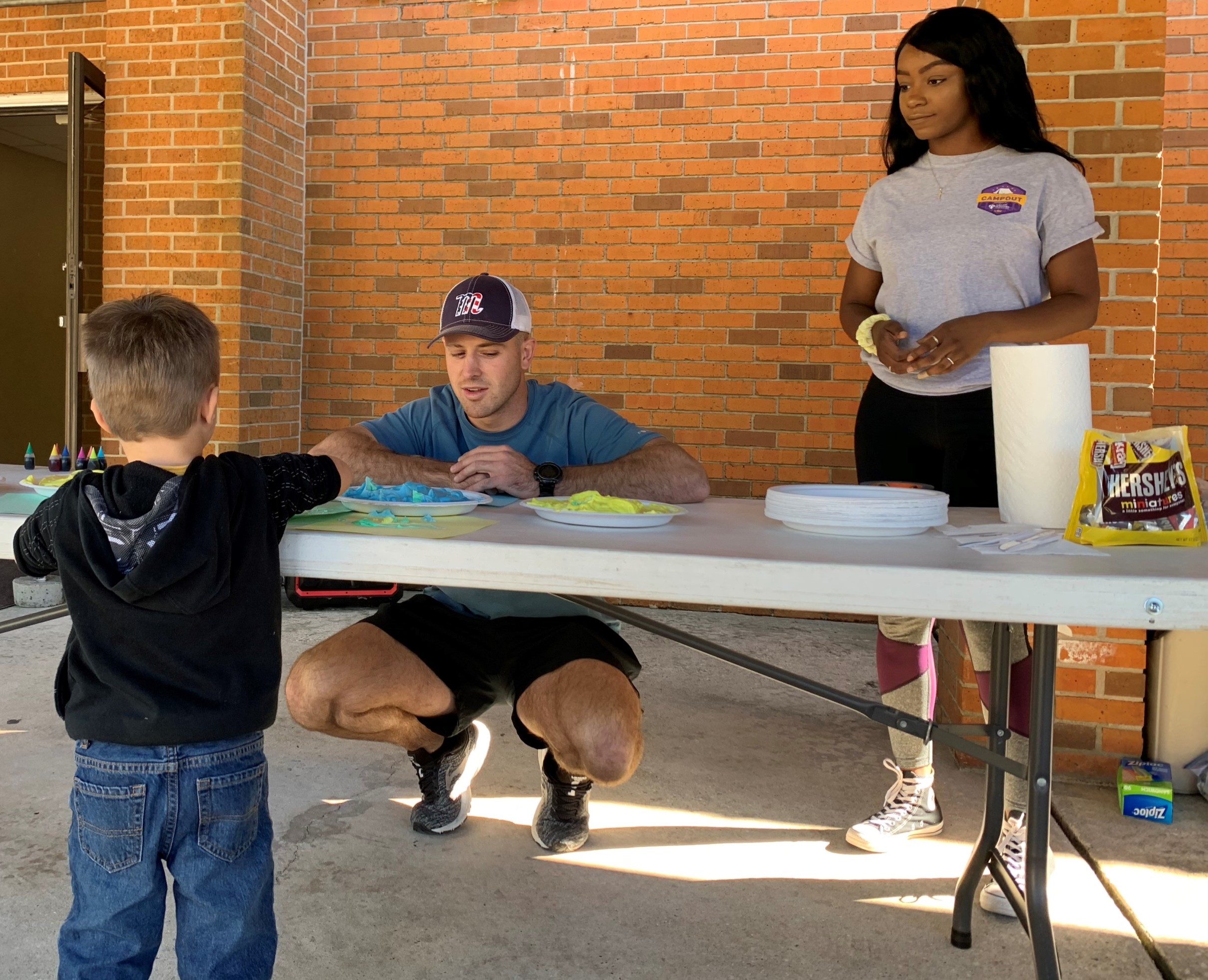
Photo Credit: Victor Castellon, LSU communication studies major
For the Foster Village, we have two groups are creating sensory processing kits so
they are making materials for these foster children that have sensory processing disorder
to just comfort themselves. One group is working to create weighted blanket kits for
volunteers to make the blankets. Again, for foster students who are going through
anxiety to comfort them. Another group this weekend is putting on a sensory processing
day where kids can go through and feel different textures, and play with different
things just to kind of comfort them. So that they can have some fun in a way that
is not overwhelming to them. I think there’s a very tangible benefit for our community
partner and the kids we’re serving there.
Q: What would you like service learning on LSU’s campus to look like in 10 years?
A: For faculty, there is this belief that it’s another thing to do that they don’t have time to do. So I think for faculty to fully embrace it and to fall in love with it, they must see the multiple levels of benefits to themselves, the students, and the community. If faculty could all take the Faculty Scholars workshop that I took 11 years ago, then they would see that there’s all sorts of support that you all can give us. I think that they think they have to go out and do this on their own and they don’t have to. I happen to hook up with the Foster Village on my own this time, but there have been many years in the past where you all have helped me find that community partner. So I think educating faculty that you’re not in this alone, that [CCELL] can help you, and [CCELL’s] not going to micromanage you would change their beliefs.
Q: Why is it important to engage in community service while in college?
A :My hope is that it's planting seeds that then will grow into a desire to serve others in their organizations, in their families, in their church groups, [and/or] their community groups. My hope is that it’s planting a love for service just in general. You know what happens? We think we are going to go in and we think we’re going to change people’s lives and make an impact. What really happens is they change us. We grow; our hearts are changed. And I think it’s awesome that there are tangible benefits for the community, but that my students would become more compassionate people and people that love to serve.
Q: Anything else you'd like to add?
A: We spend, as faculty and students, so much time on this campus; so what we do here has to be lasting. That’s why I love service-learning because the lessons that they learn and the impact that they make lasts beyond the exam. They are going to forget what’s in chapter 8 of the textbook, but they are not going to forget interacting with these children that had nothing. And that’s why I love service-learning! We’re not wasting our time; we’re making our time here count for something.
Layah Khalif, Senior, Biological Engineering major, College of Engineering
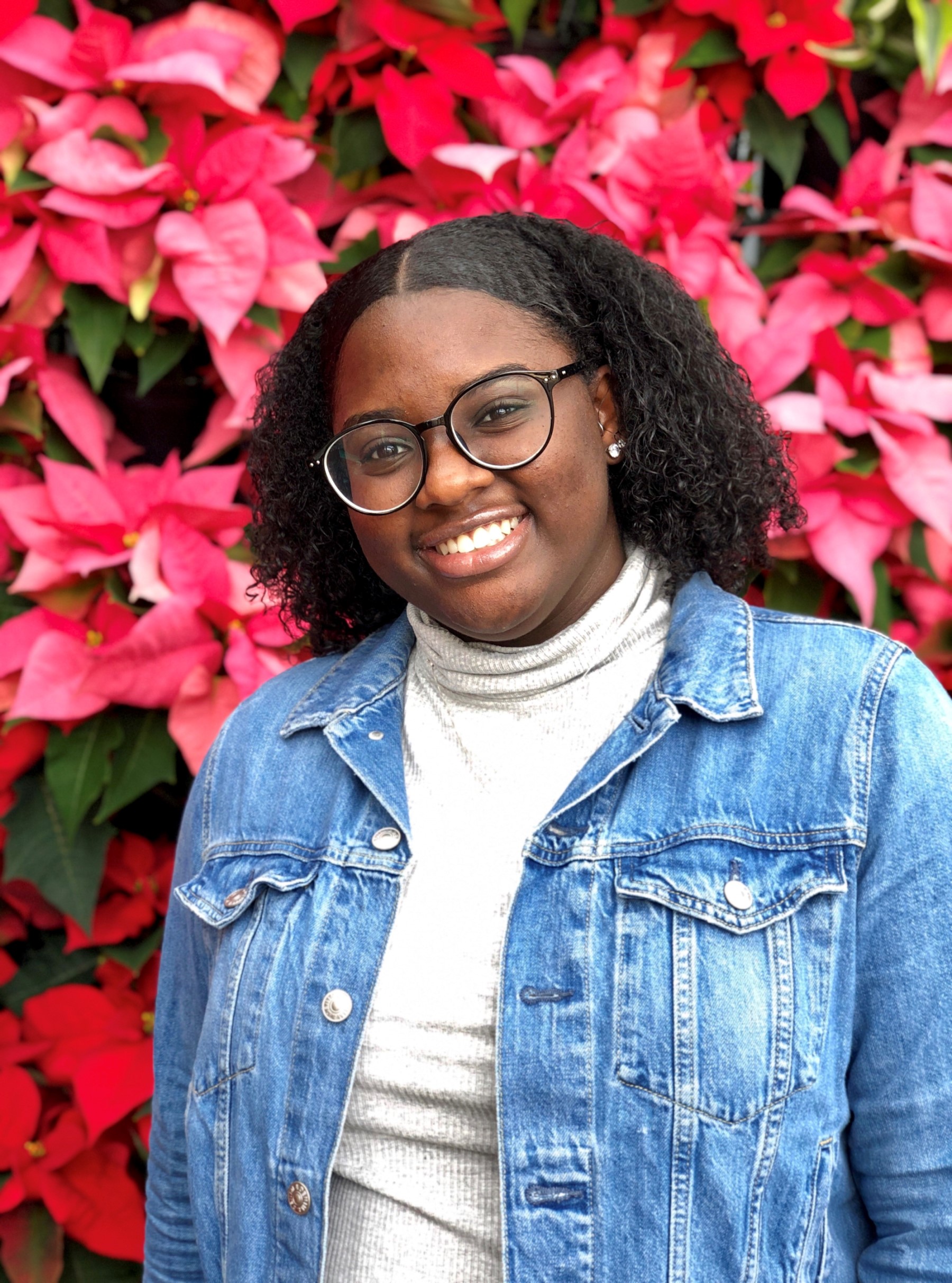
LSU biological engineering senior Layah Khalif, who also minors in leadership development, will graduate with the Engaged Citizen distinction Fall 2019.
Q: What does service learning mean to you?
A: To me, service learning most directly [means] incorporating some kind of community engagement into your everyday course load, taking what you’re learning in the classroom, and applying it in a beneficial way to the community.
Q: What was the first service-learning class that you took and what was the experience like?
A: My first service learning course was actually my first intro BE course (BE 1251:
Introduction to Engineering Methods), taught by my advisor Dr. Marybeth Lima and they
call it “the playground course.” We were learning how to use 3D engineering software
on the computer and also using her personal project of building playgrounds at schools
(LSU Community Playground Project) that don’t have play areas. We were using that
3D software to actually construct playgrounds that would eventually be realized into
physical designs at these schools. One thing that class mainly taught me was how engineering
is everywhere. You don’t think of engineering when you’re building a playground. So
that was one of the biggest things…seeing how the engineering design process is incorporated
everywhere, and especially in things as simple as play. That was fun!
Q: Why did you choose to take S-L classes?
A: I really kind of fell into it. My first course was the “playground course,” and in addition to that, I had to take a biomaterials course (BE 4303: Engineering Properties of Biological Materials, taught by Dr. Dorin Boldor), which is also service-learning.
I had always just done service in general outside of my classwork and so after realizing that the Engaged Citizens Program existed, I was like “Oh okay, well this will be cool. Maybe I can get one more.” These were always the classes that I tended to enjoy the most, believe it or not, so it was kind of a natural progression after taking those two to want to take a few more.
Q: What have you gained by participating in your service-learning courses?
A: I knew nothing about Louisiana, nothing about Baton Rouge other than LSU is here. Coming to a new place, school, and environment, and also being involved in those service learning courses and putting myself out into the community really gave me that knowledge of what it means to be here as a resident of Baton Rouge. Overall, it broadened my scope of not just LSU but focusing on Baton Rouge as a city and Louisiana as a state and making an impact not just on this campus because LSU is not the only thing here. I was encouraged to take what is here and allow it to continue to radiate.
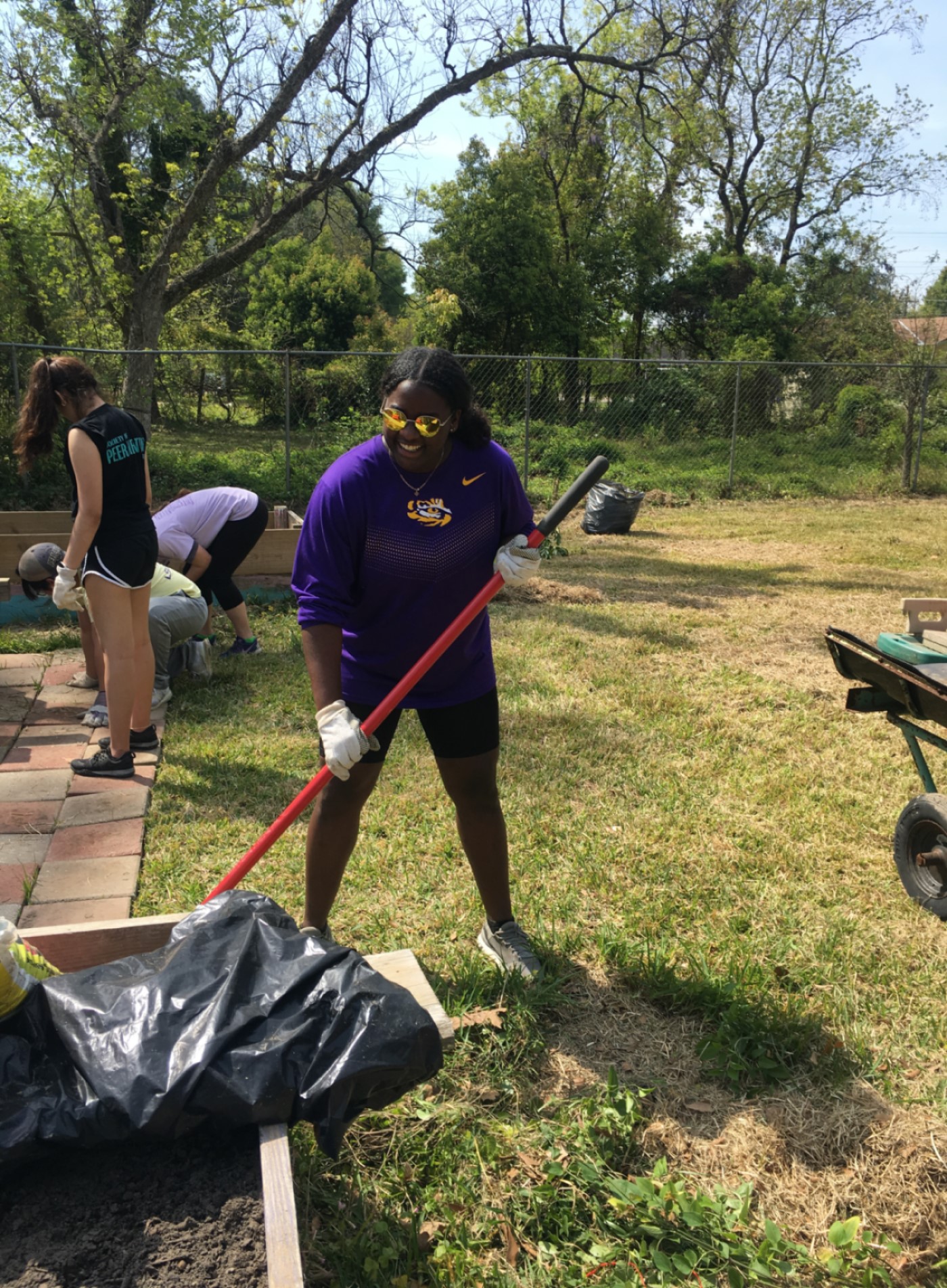
Khalif uproots a tree during Geaux BIG Baton Rouge.
Q: Have you become more civically engaged as a result of participating in service learning?
A: Yes, definitely. As I mentioned before, I’m always engaged in service as something I feel like I should do, a good thing to do, the right thing to do— But, having that also incorporated into my courses made the information easier to learn. You’re not only getting the problem-solving in class and just going home, it’s a continuation. It made me want to get more involved and see what else I could do while I was here.
Q: What would you like service learning on LSU’s campus to look like in 10 years?
A: I would say more prevalent, honestly, I was taking those two service-learning courses already in my flow chart as an engineering student, so I didn’t really even know what that meant initially, didn’t know why that was in my schedule. And really, I feel like with all the classes that are offered here, there can be a service-learning component to a majority of them that is not currently being [explored]. Having a larger selection of S-L courses and making teachers understand that this could not only impact their students but the community as well, would be awesome.
Q: How did you start doing community service?
A: I’ve just been in different organizations throughout my life and in community organizations,
so community service is a big thing [laughs]. The first thing that pops in my mind
is Jack & Jill, it was an organization I joined in high school (in Plano, Texas),
another organization for underprivileged minority students. We went to Minnie’s Food
Pantry like twice a month as a requirement for the organization to be civically engaged,
so of course, as a high school student then you’re like “Ugh, this is such a pain,
getting up at 8am, going to do service, and being required to do this type of thing.”
I was also in National Honor Society in high school, so it’s just always something
that I’ve just done and not necessarily voluntarily—something that I was usually told
to do. It wasn’t until I got a little bit older that I actually started finding joy
in service, and participating more voluntarily and more willingly on my own.
Q: Why is it important to engage in community service while in college?
A: You’re at LSU and it’s such a big university, so your focus is LSU. Everything
you’re surrounded with is LSU, and not necessarily Baton Rouge, so I feel like LSU
kind of skews your perspective a little bit. I feel like it’s important to engage
in service especially because you’re a student here, you’re spending a lot of your
time here, you’re basically living here, but you have to know about where you are,
right? Beyond just the university. I feel like service is a good way to be involved
with what’s around you, and get to know who’s around you…. I feel like [service] has
impacted my college experience pretty positively, just because I’ll take away from
here more than just LSU. I’ll be taking the community that is LSU, what LSU touches
and what surrounds LSU.Q: Why is it important to engage in community service while
in college?
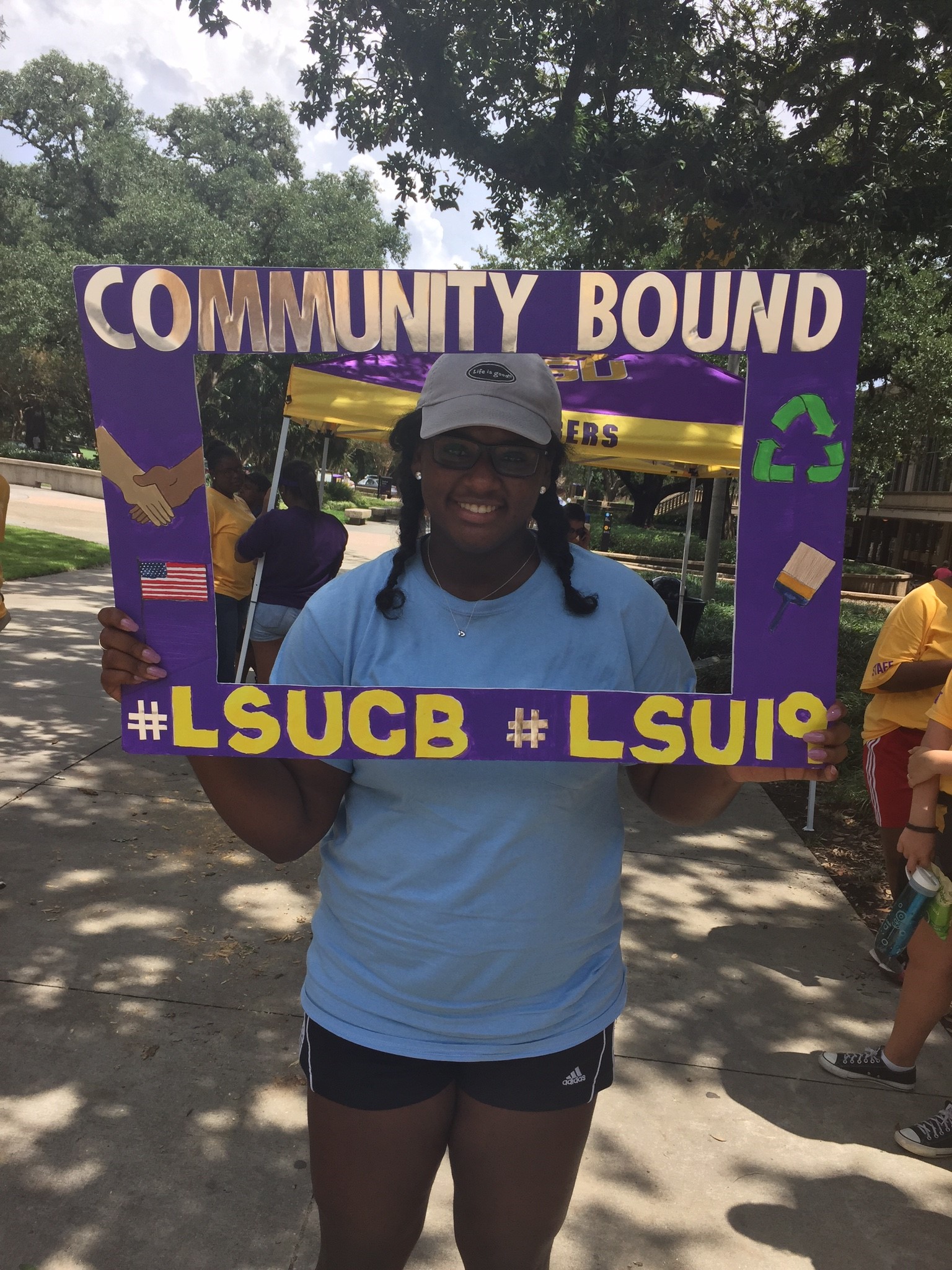
Khalif, a native of Milton, Ga., beams proudly as a freshman at her very first LSU Community Bound experience.
Knock Knock Children's Museum, represented by Director of Visitor and Volunteer Services Monica Dugas
Q: Tell me about your organization. What critical need does it address in the Baton Rouge community?
A: Knock Knock Children’s Museum is all about children learning through play. We have 18 different learning zones and we have outdoor play as well. We want to be that spark for the Baton Rouge community that leads to better early learning opportunities. In this day and age when technology is everywhere, kids don’t necessarily know how to play anymore so we want to be that opportunity for kids to just be themselves.... Also, our mission is to be accessible to all, so we have programs and different opportunities to reach all demographics of children, ages birth through 8 is our target age but, honestly, older kids have fun too. We even [hold] adult events here, so we have all of those opportunities in the hopes that children will be more educated in the community and learn through their play experience.
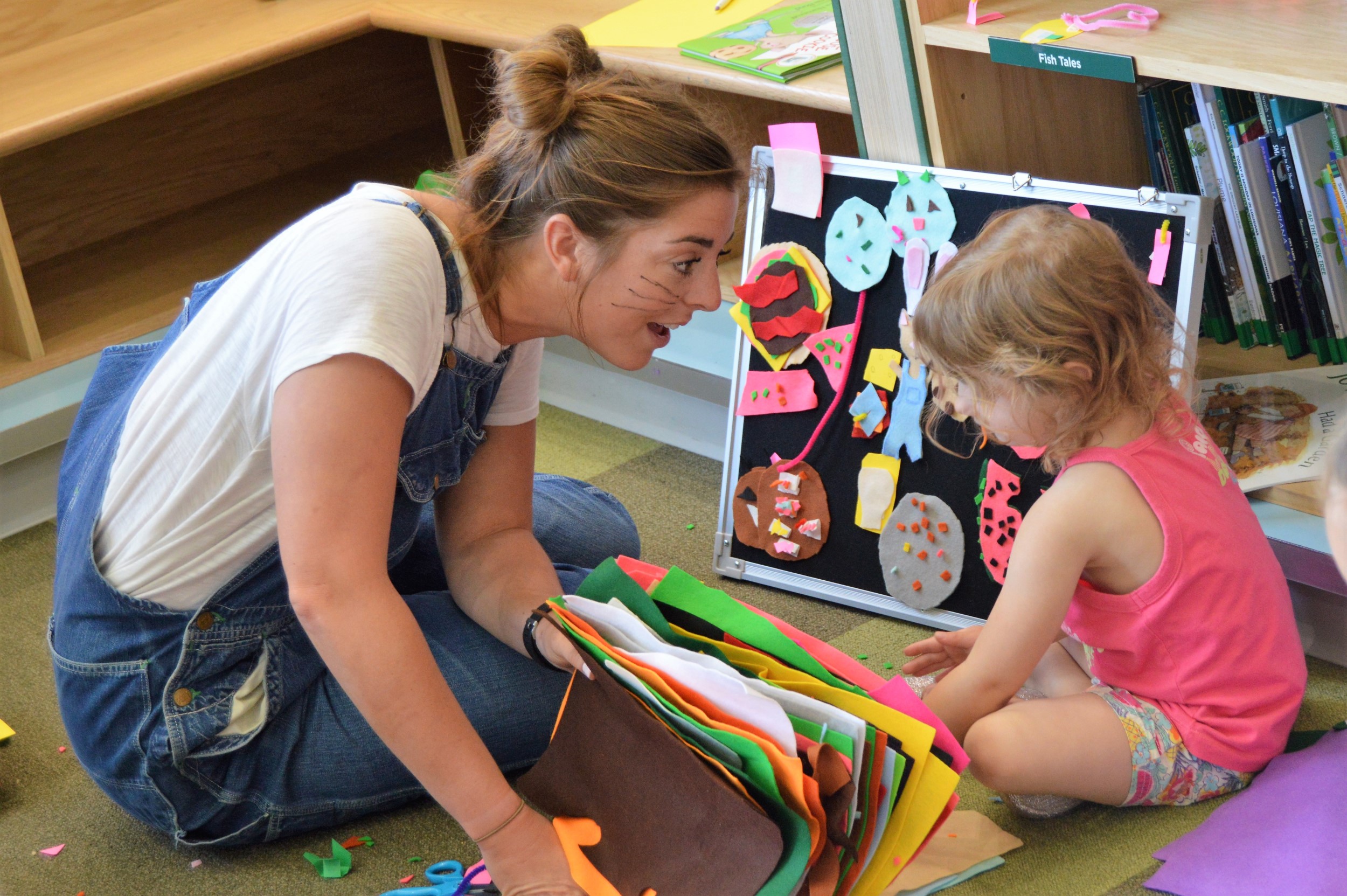
Q: What LSU courses and professors has your organization partnered with?
A: We have a really strong relationship with the School of Education and Dr. Jennifer Baumgartner. I think she actually nominated us for the Happy Award a couple of years ago, so that’s probably the biggest [LSU student population] that we’ve worked with. A lot of their [prekindergarten through third grade] PK-3 students have come in and volunteered at the museum, but also they’ve helped to develop programming. Towards the end of the semester, part of their grade was to develop what we call a "pop-up," (which is kind of like a pop-up shop) but it’s part of a program they develop. [Students] came up with the materials, the lesson planning, everything and implemented it at the museum during spring break one year. The Department of Child & Family Studies (under the School of Social Work) has lots of children that come through, also.
Q: Why is being a community partner important for your organization and the population that you serve?
A: Our volunteer program has two purposes. One, of course, it helps us to extend our mission, extend our programming and offer more to the Baton Rouge community if we have these service-learning students that volunteer with us. But also, [service-learning students/faculty] have helped us come up with programming that benefits the museum, but also we want those students that volunteer to benefit as well. We want them to learn, we want them to grow. We’ve even had some go on to work with us on our staff, so its [importance is] two fold: one, they help us as a museum by volunteering but also, we help them whether its networking opportunities, skills for their profession, the pop-ups that they develop for their class grade, etc. We want it to be beneficial to both sides.
Q: What are some projects or tasks that students have worked on for your organization?
A: There are several ways that students can help. We call our volunteers "Ambassadors of Play," so they're working in the museum in a learning zone and interacting with kids and families. It might be, for example, if they’re early childhood education majors, they can practice those skills of getting the kids to learn. There are ways that you can facilitate that, but still have unstructured play [by] asking those open-ended questions instead of yes/no questions that helps enhance the play experience.
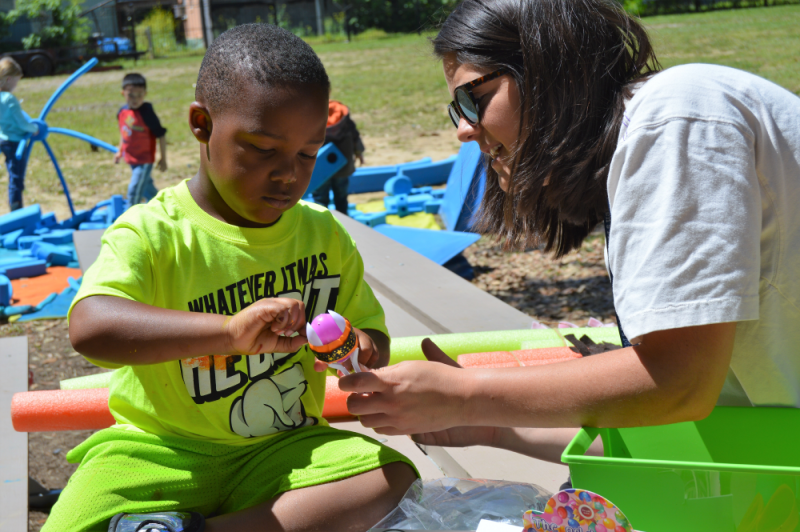
Photo Credit: Knock Knock Children's Museum
Q: What has been the most memorable thing you have seen a student do while serving at your organization?
A: The pop-ups are the most memorable thing, we’ve had some really great ones. I remember we had a student with Child & Family Studies and she made kaleidoscopes with the kids as her pop-up. During that [year's] spring break, we had Jennifer Baumgartner’s class, which probably had a dozen pop-ups that week. They developed an activity that went along with one of our learning zones, for example, with Go Go Garage. They may have done an activity that involved racing cars, I think they did like balloon cars so the kids made their own cars and raced them. Or in Storybook Tree [activity zone], they had I think felt story boards where they told stories and read stories. So all of the pop-ups they’ve developed have really become Knock Knock favorites.
Q: What would you want the future of service work at your organization to look like in 10 years?
A: I would like to see us expand to other areas, not just early childhood education. We’re a full-fledged non-profit, [which means] we could have marketing students, we could have those that are going to go into fundraising, and the business side of running a non-profit. We’ve had a couple of interns in marketing, but we really haven’t expanded into those areas.... We’re also working with Franciscan University radiology tech students [as part of our "Love Your Bones" project] where they come in and teach kids about radiology and the bones in the body. It's really great! So I would like for other areas, other professors or colleges to think outside the box about how we can help those students in service-learning and how they can help us provide for children in the community.
Q: Why should more students participate in service-learning?
A: I think service-learning is one of the best things to come around. I think it’s a wonderful program. They didn’t have a lot of that when I was in school, but I think it gives the students real-life learning opportunities. It might give them a heads up once they enter the workforce. I know for example; I have a teenage daughter that’s trying to decide what she wants to do right now. She’s a junior in high school, and so for her I’ve been looking for opportunities where she can maybe experience the field of study she’s thinking about before she actually goes to school. I think we can reach those high school students.... I think you don’t necessarily know what some of it’s like until you get into it, so I think we can provide some of those opportunities for the service-learning students.